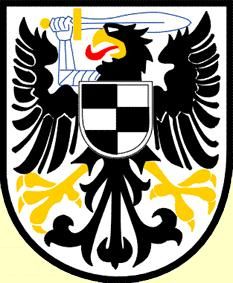Posen-Westpreussen: Difference between revisions
Knorrepoes (talk | contribs) m (Text replacement - "{{media1}}" to "{{media}}") |
Knorrepoes (talk | contribs) m (Text replacement - "|Arms of {{PAGENAME}}]]" to "|Coat of arms (crest) of {{PAGENAME}}]]") |
||
| Line 3: | Line 3: | ||
'''POSEN-WESTPREUSSEN''' | '''POSEN-WESTPREUSSEN''' | ||
[[File:posenwp.jpg|center| | [[File:posenwp.jpg|center|Coat of arms (crest) of {{PAGENAME}}]] | ||
{| class="wikitable" | {| class="wikitable" | ||
Revision as of 15:27, 20 August 2023
POSEN-WESTPREUSSEN
| German | blazon wanted |
| English | blazon wanted |
Origin/meaning
After the Versailles treaty in 1919, a large part of the Prussian provinces Posen and Westpreussen were transferred to the new Polish republic. The remaining area was transformed into a bufferzone, or Grenzmark named Posen-Westpreussen.
The arms were from 1925-1929 identical to the arms of Westpreussen, without the supporters and helmet. In 1929 the Polish eagle was replaced by a small shield showing the colours of the flags of Westpreussen (black-white-black) and Posen (white-black-white).
In 1938 the Grenzmark ceased to exist.
This page is part of the German heraldry portal |
Heraldry of the World |
|
German heraldry:
|
Selected collector's items from Germany:
|
Contact and Support
Partners:
Your logo here ?
Contact us
© since 1995, Heraldry of the World, Ralf Hartemink 
Index of the site
Literature : Schurdel, H.D. Flaggen und Wappen Deutschland. Battenberg, Augsburg 1995.












